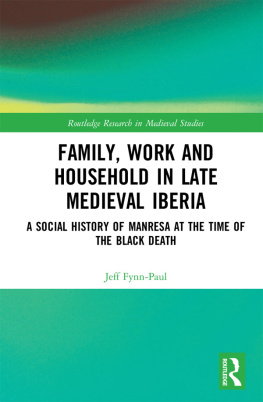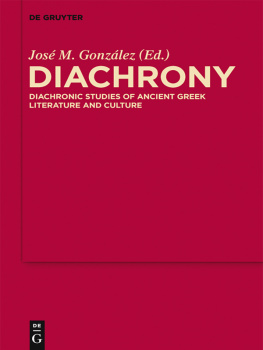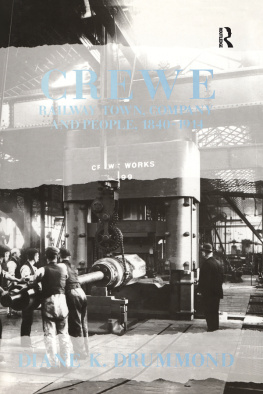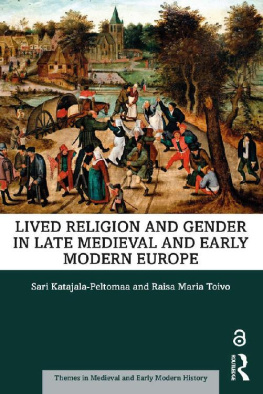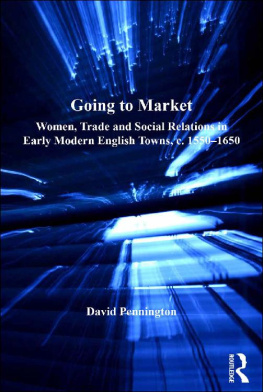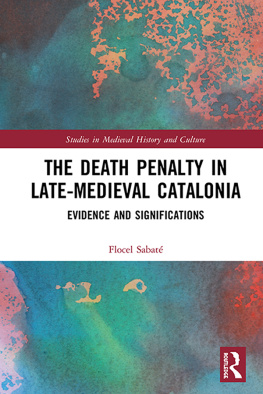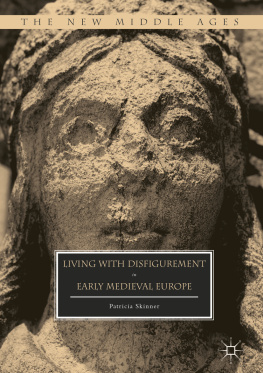Family, Work and Household in Late Medieval Iberia
Family, Work and Household presents the social and occupational life of a late medieval Iberian town in rich, unprecedented detail. The book combines a diachronic study of two regionally prominent familiesone knightly and one mercantilewith a detailed cross-sectional urban study of household and occupation. The town in question is the market town and administrative centre of Manresa in Catalonia, whose exceptional archives make such a study possible. For the diachronic studies, Fynn-Paul relied upon the fact that Manresan archives preserve scores of individual family notarial registers, and the cross-sectional study was made possible by the Liber Manifesti of 1408, a cadastral survey which details the property holdings of individual householders to an unusually thorough degree.
In these pages, the economic and social strategies of many individuals, including both knights and burghers, come to light over the course of several generations. The Black Death and its aftermath play a prominent role in changing the outlook of many social actors. Other chapters detail the socioeconomic topography of the town, and examine occupational hierarchies, for such groups as rentiers, merchants, leatherworkers, cloth workers, women householders and the poor.
Jeff Fynn-Paul is university lecturer at Leiden Universitys Institute for History.
Routledge Research in Medieval Studies
For a full list of titles in this series, please visit www.routledge.com
9Medieval Hostageship c.700-c.1500
Hostage, Captive, Prisoner of War, Guarantee, Peacemaker
Edited by Matthew Bennett and Katherine Weikert
10New Studies in Medieval and Renaissance Poland and Prussia
The Impact of Gdansk
Edited by Beata Mozejko
11The Colonies of Genoa in the Black Sea Region
Evolution and Transformation
Evgeny Khvalkov
12The Plow, the Pen and the Sword
Images and Self-Images of Medieval People in the Low Countries
Rudi Knzel
13Family, Work and Household in Late Medieval Iberia
A Social History of Manresa at the Time of the Black Death
Jeff Fynn-Paul
Previous titles to appear in Routledge Research in Medieval Studies include:
The Generation of Identity in Late Medieval Hagiography Speaking the Saint
Gail Ashton
Performing Virginity and Testing Chastity in the Middle Ages
Kathleen Coyne Kelly
Women Pilgrims in Late Medieval England
Susan S. Morrison
Family, Work and Household in Late Medieval Iberia
A Social History of Manresa at the Time of the Black Death
Jeff Fynn-Paul

First published 2018
by Routledge
711 Third Avenue, New York, NY 10017
and by Routledge
2 Park Square, Milton Park, Abingdon, Oxon OX14 4RN
Routledge is an imprint of the Taylor & Francis Group, an informa business
2018 Taylor & Francis
The right of Jeff Fynn-Paul to be identified as author of this work has been asserted in accordance with sections 77 and 78 of the Copyright, Designs and Patents Act 1988.
All rights reserved. No part of this book may be reprinted or reproduced or utilised in any form or by any electronic, mechanical, or other means, now known or hereafter invented, including photocopying and recording, or in any information storage or retrieval system, without permission in writing from the publishers.
Trademark notice: Product or corporate names may be trademarks or registered trademarks, and are used only for identification and explanation without intent to infringe.
British Library Cataloguing-in-Publication Data
A catalogue record for this book is available from the British Library
Library of Congress Cataloging-in-Publication Data
A catalog record for this book has been requested
ISBN: 978-1-138-81534-6 (hbk)
ISBN: 978-1-315-74676-0 (ebk)
Typeset in Sabon
by Apex CoVantage, LLC
Contents
Part I
Knightly and Burgher Families
Part II
Occupations and Households in Manresa
Bages The region around Manresa, centered on the Pla de Bages (plain of the Bages), which offers a rare spot of relatively level ground in the otherwise rugged lower Pyrenean foothills, as the rivers Cardoner and Llobregat approach their confluence some 5km south of Manresa. Long demarcated by the borders of the vegueria (q.v.) of the Bages.
Batlle Bailiff. Royal bailiffs were low-level crown officials who nonetheless had significant executive and fiscal powers at the local level.
Castellan A feudal lord who, by right of his status as a member of the gentry, the lowest order of nobility, had a right to monopolize violence on his estate, acting as judge and legislator for his tenants, except where such rights were expressly reserved to the king. In the fourteenth century, castellans could be either donzells (squires) or knights. Persons generoses, as they were known, were represented by the bra armada (noble estate) in the Catalan Parliament.
Censal Originally any annual rent, including emphyteusis, or quit-rent on land. In their most influential form, this was a perpetual, transferable instrument of public debt secured on civic revenues and paying between 5% and 10% interest. These became widely available after 1359, and their widespread acceptance and contractual legality resulted in the subsequent spread of private censals, guaranteed by the government, as a means of transferring capital between individuals on a long-term basis. A relatively conservative investment which nonetheless proved both stable and popular with holders of capital throughout the later fourteenth and fifteenth centuries.
Conseller One of between four and six men who shared the highest office in Manresan civic government after 1315. They served for one year and were elected every 1 April. Election conferred the lifetime title venerabilis on a conseller, giving them titular parity with knights and donzells, until knights were awarded the superior title honorabilis in 1354.
Corts Catalan Parliament. This consisted of the bra ecclesiastic (representing the clergy) the bra armada (representing the nobility and the knighthood), and the bra reial (representing the citizens of the royal cities and towns). Beginning in the early fourteenth century, Manresa, like most royal towns, sent two representatives to the Corts. Barcelona customarily sent five.
Diputaci The permanent arm of the Catalan Corts, which began its existence in 1359, at the time that the public debt became permanent as a result of the massive borrowing (facilitated by sales of violaris and censals) that occurred as a result of the Castilian War (commonly known as the War of the Two Peters, 13561366). The formation of the Diputaci was the result of a compromise between the Corts and the Crown over the management of the newly expanded funded public debt.
Jurat One of between 16 and 30 men who sat as an advisory body to the Consellers. They sat for one year; received no title. Together with the consellers

